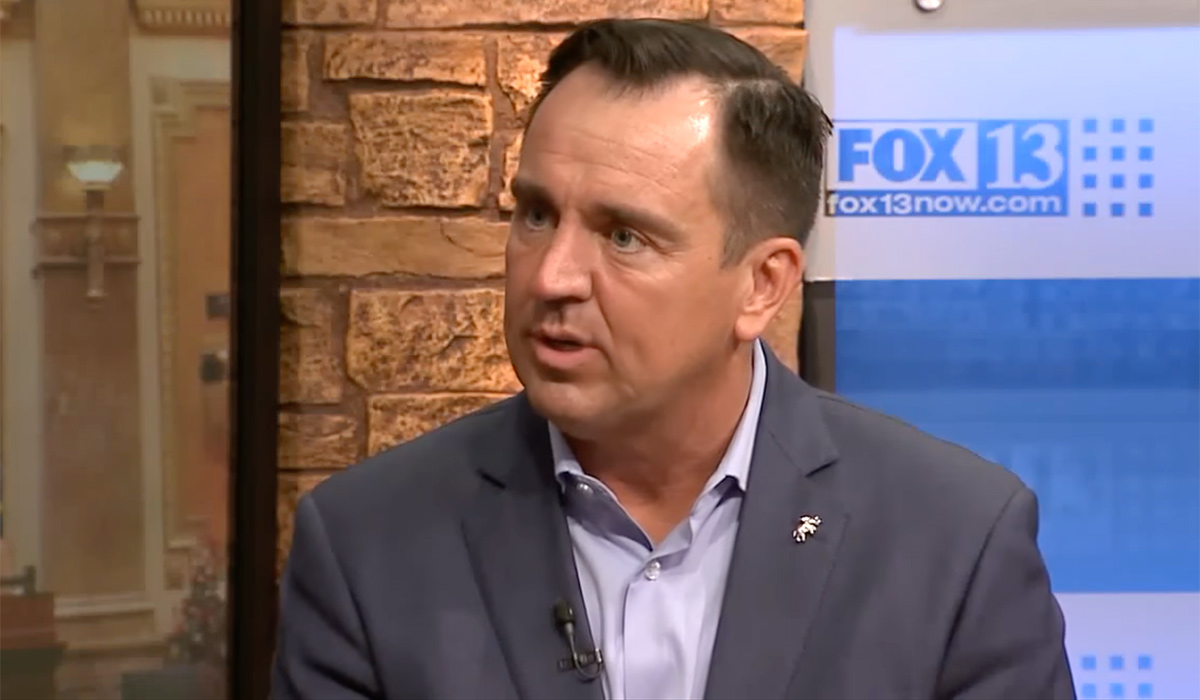


NRPLUS MEMBER ARTICLE A candidate running in Utah’s upcoming special congressional election has urged a more cooperative relationship with China, at one point traveling to Shanghai to participate in a conference headlined by officials from Chinese Communist Party bureaus tasked with influencing foreign figures. He has also blamed U.S. military and intelligence efforts for demonizing China.
Former Utah house speaker Greg Hughes announced his campaign for the seat earlier this month. It’s being vacated by Representative Chris Stewart, who announced his planned resignation in May over his wife’s health situation.
If Hughes, a Republican running in a heavily GOP-leaning district, were to win the special election, which is slated for September, his arrival on Capitol Hill would mark a notable departure from many of the stances that Stewart has advocated. The Utah congressman is a staunch China hawk who also sits on the House Intelligence Committee. Hughes, by contrast, has a history of interactions with Chinese party and state entities — a history for which he recently expressed some regret.
In March, the Associated Press published an extensive investigation into Chinese-government-influence campaigns in Utah, finding that Hughes was among a group of state lawmakers who had traveled to China multiple times. The benefactor behind the junkets is not known.
In an interview for the AP story, Hughes said he has come to believe that his trips to China were a pretext for Chinese officials to influence him: “It’s a trip not worth taking,” he said.
During what seems to be Hughes’s most recent trip to China, in April 2019, he participated in a conference hosted by an outfit called the Shanghai Institute for American Studies, which is funded by the Shanghai municipal government. The conference’s title was “Forum on Chinese–American Civilian Diplomacy,” an event with the theme “From Shared History to Shared Future.”
Other participants in the conference included several officials involved in the system overseen by the Chinese Communist Party’s United Front Work Department, a massive influence bureau that Beijing uses to engage and influence nonparty audiences including foreign elites, according to a Chinese-language article on a Web page focused on the united front’s key convening body. Those participants included Zhou Hanmin, a standing member of the Chinese People’s Political Consultative Conference, and Xie Yuan, the vice president of the Chinese People’s Association for Friendship with Foreign Countries (CPAFFC). In 2020, then–secretary of state Mike Pompeo said the latter group, a united-front entity, is engaged in an effort to “malignly influence state and local leaders.”
Another CCP bureau, the International Liaison Department, was represented at the conference by its former vice minister, Yu Hongjun. That department works to influence foreign political parties, including through regular dialogues with representatives of both the Democratic and Republican Parties.
At the time, Hughes was a prominent opponent in Utah of the Trump administration’s trade tariffs on Chinese imports. Hughes had already taken a stand against the tariffs in a 2018 interview with the CCP’s Global Times propaganda outlet: “Utah is not like Washington, D.C. Utah is a friend of China, an old friend with a long history.”
Soon after returning from his trip, Hughes expressed his dismay with the Trump policy, continuing to urge a more conciliatory approach to dealing with China.
During an interview on a radio show dedicated to Utah politics, Hughes said: “The idea that we would contain China in some way is naive, or we’re lying to ourselves, because you’re not going to contain an economy that’s growing that way, and I don’t think you’d want to.”
“On a sub-national level, we should be leading by example and letting these kids, as the world is flat, letting them speak to one another in real time,” Hughes added, apparently referring to the phrase popularized by New York Times columnist Thomas Friedman’s book about globalization. “If we can lower those barriers, I think that Utah to our sister provinces and the partnerships we’ve made over the years, we can lead by example, and other states will be jealous.”
Some of the Chinese government’s “sister-city” partnerships, however, have since been exposed as potential conduits for a foreign-influence operation. In July of last year, the National Counterintelligence and Security Center warned that while there’s nothing inherently nefarious about those political and cultural-exchange partnerships, usually but not always between cities in China and the U.S., Beijing has previously used them to exert pressure on sub-national government entities. In its 2020 warning about the CPAFFC, which oversees the sister relationships, the State Department reported that it is “tasked with co-opting subnational governments.”
Later in the interview, Hughes also blamed “our intelligence and our military efforts from both countries” for setting up a narrative that’s led to a “palpable fear in terms of China and its perceived aggression.”
A representative for Hughes did not respond to National Review’s request for comment. Other candidates in the race include Celeste Maloy, a Stewart staffer; former Utah lawmaker Becky Edwards; Republican National Committee member Bruce Hough; and Jordan Hess, a former staffer for Senator Mike Lee.
